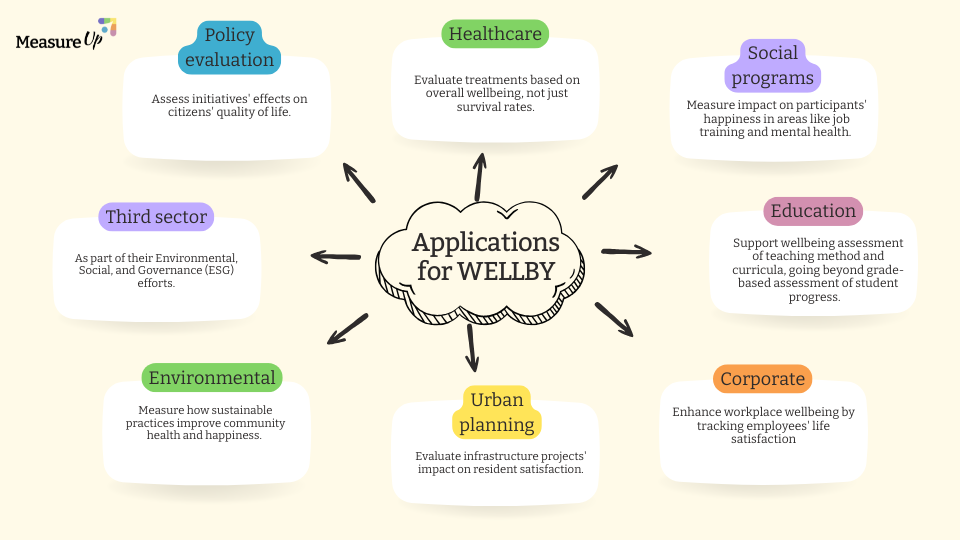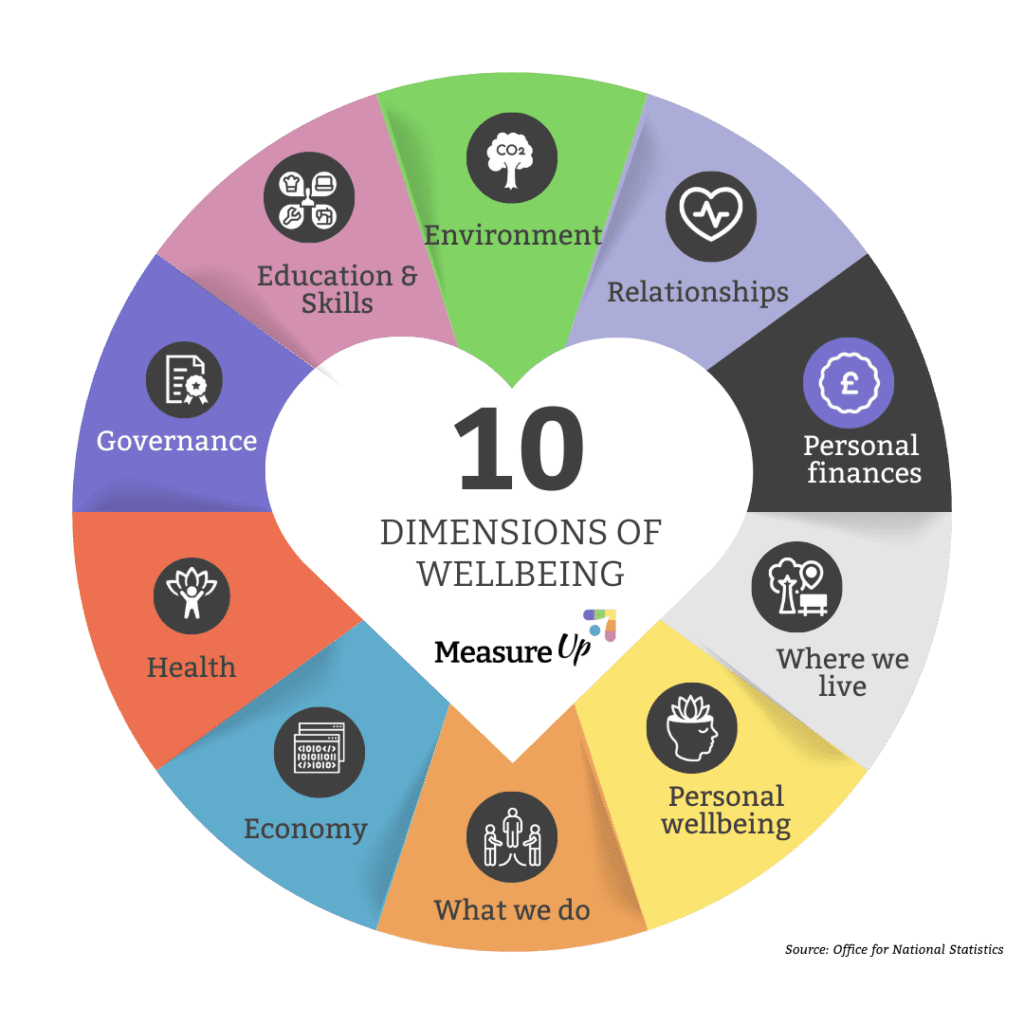How to measure wellbeing using the WELLBY approach
Posted: October 29, 2024
In today’s fast-paced world, people are recognising the importance of not just living longer but living better.
This is where the concept of WELLBY, or Wellbeing-adjusted Life Year, comes into play.
In this blog, we will explore the definition of wellbeing and how the WELLBY approach is revolutionising the way we measure and enhance it.
What is wellbeing?
“Wellbeing” is a broad concept that encompasses various aspects of life, including physical health, mental health, emotional stability, and social connections. It is about feeling good and functioning well. It represents a holistic state of positive health, happiness, and life satisfaction, beyond just the absence of illness. This can be categorised into three levels:

- Individual wellbeing – are we feeling good and functioning well?
- Community wellbeing – Are we thriving together?
- National wellbeing – How are we doing as a whole, and is this sustainable for the future?
Recognising social value means understanding and managing these wellbeing aspects across individuals, communities, and nations. So understanding and incorporating wellbeing measurement and valuation into your social value practice is a fundamental step for anyone aiming to improve their social value.
Introducing the WELLBY approach
The WELLBY or Wellbeing-adjusted Life Year, is a wellbeing valuation method that provides a holistic measure of societal welfare by combining life length with quality1.
A WELLBY is defined as a one-point change in life satisfaction (on a scale from 0 to 10) affecting one person for one year2.
This metric aids policymakers in evaluating the effectiveness of various programs and initiatives in enhancing overall life satisfaction.
How WELLBY works
The WELLBY approach is based on the idea that a good society is one that enables its people to live long, fulfilling lives. Here’s how it works:
- Measurement: Wellbeing is measured using surveys that ask individuals to rate their life satisfaction on a scale from 0 to 10.
- Calculation: Changes in life satisfaction are tracked over time, with each point increase for a year equating to one WELLBY.
- Monetisation: The Green Book sets a central value of £13,000 for one WELLBY, based on 2019 prices.
- Evaluation: The total WELLBYs generated by a policy or intervention is calculated to assess its overall impact on societal wellbeing.
You can find more information about WELLBY in “What is a WELLBY and what is it worth?” written by State of Life. Their ‘Where’s WELLBY poster is a great way to visualise the value of the different factors that matter to our lives based on the WELLBY approach.
How can WELLBY be applied across various sectors?
The WELLBY approach is applicable across sectors interested in life satisfaction.

- Policy evaluation: Assess initiatives’ effects on citizens’ quality of life.
- Healthcare: Evaluate treatments based on overall wellbeing, not just survival rates.
- Social programs: Measure impact on participants’ happiness in areas like job training and mental health.
- Education: Support wellbeing assessment of teaching method and curricula, going beyond grade-based assessment of student progress.
- Corporate sector: Enhance workplace wellbeing by tracking employees’ life satisfaction
- Urban planning: Evaluate infrastructure projects’ impact on resident satisfaction.
- Environmental policies: Measure how sustainable practices improve community health and happiness.
- Third sector: to contribute to their Environmental, Social, and Governance (ESG) efforts.
Case study: Using WELLBY to evaluate a mental health program
TL;DR: For a practical example of the WELLBY approach, consider a mental health program that increased participant life satisfaction from 5 to 7, generating 2,000 WELLBYs and £26 million in social value. This underscores the approach’s potential to justify continued funding and guide impactful policy decisions.
Measurement
A local government implements a mental health program aimed at reducing anxiety and depression among its residents. The program includes free counselling sessions, stress management workshops and community support groups.
Before the program starts, a survey is conducted to measure the life satisfaction of participants on a scale from 0 to 10. The average life satisfaction score is 5. After one year of the program, the same survey is conducted again, and the average life satisfaction score has increased to 7.
Calculation
To calculate the WELLBYs generated by the program, we consider the change in life satisfaction and the number of participants. Let’s say 1,000 people participated in the program.
- Initial life satisfaction score: 5
- Post-program life satisfaction score: 7
- Change in life satisfaction: 7 – 5 = 2 points
- Number of participants: 1,000
The total WELLBYs generated by the program is calculated as follows:
Total WELLBYs = Change in life satisfaction*Number of participants
Total WELLBYs = 2 * 1,000 = 2,000
Monetisation
Monetised social value generated by the program can be calculated as total WELLBYs generated times the value of 1 WELLBY.
2,000*£13,000 = £26,000,000 in 2019 prices
Evaluation
The program generated 2,000 WELLBYs, indicating a significant positive impact on the wellbeing of the participants. This metric helps policymakers understand the value of the program in terms of improving life satisfaction and can be used to justify continued or increased funding for similar initiatives.
Monetisation allows us to express the social benefit of the programme in £ and perform cost-benefit analysis of the programme to assess a) whether the programme was worth the money invested in it and/or b) which programme out of several alternatives delivers the best value for money.
Key advantages of the WELLBY approach
The WELLBY approach represents a significant advancement in how we measure and value wellbeing. As we continue to prioritise wellbeing in our personal lives and public policies, the WELLBY metric will be an invaluable tool in guiding our efforts towards a happier, healthier society.
- Holistic measurement: By focusing on both the length and quality of life, WELLBY offers a more comprehensive understanding and wellbeing metric of what it means to live well.
- Policy impact: Offers a tangible way to measure the effectiveness of public initiatives on life satisfaction.
- Versatile applications: From healthcare to urban planning, the WELLBY approach is adaptable across various fields.
- Monetary valuation: Facilitates cost-benefit analysis of programs by assigning a monetary value to wellbeing changes.
- Strategic insight: Helps organisations and governments optimise resource allocation for enhanced societal welfare.
MeasureUp is a free resource designed for organizations aiming to demonstrate the social, environmental, and economic advantages of engaging in responsible business practices. Many of MeasureUp’s outcomes are based on WELLBY.
References:
- Helliwell, J. F., Layard, R., & Sachs, J. (Eds.). (2023). World Happiness Report 2023. Sustainable Development Solutions Network. Retrieved from https://worldhappiness.report
- State of Life. (2023). Measuring and Valuing Social and Economic Impacts. Retrieved from https://stateoflife.org
- What Works Wellbeing. (2023). Evidence for Wellbeing Policy and Practice. Retrieved from https://whatworkswellbeing.org
- HM Treasury. (2021). Wellbeing guidance for appraisal: Supplementary Green Book guidance. Retrieved from https://assets.publishing.service.gov.uk/government/uploads/system/uploads/attachment_data/file/1005388/Wellbeing_guidance_for_appraisal_-_supplementary_Green_Book_guidance.pdf
- Office for National Statistics. (2023). Surveys using the 4 Office for National Statistics personal wellbeing questions. Retrieved from https://www.ons.gov.uk/peoplepopulationandcommunity/wellbeing/methodologies/surveysusingthe4officefornationalstatisticspersonalwellbeingquestions
- State of Life. (2023). WELLBY Guide. Retrieved from https://www.stateoflife.org/wellby